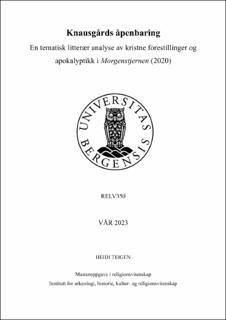Knausgårds åpenbaring: En tematisk litterær analyse av kristne forestillinger og apokalyptikk i Morgenstjernen (2020).
Master thesis
Permanent lenke
https://hdl.handle.net/11250/3071682Utgivelsesdato
2023-05-30Metadata
Vis full innførselSamlinger
- Master theses [240]
Sammendrag
Karl Ove Knausgårds roman Morgenstjernen (2020) er preget av en uhyggelig stemning, og det er flere urovekkende tegn og hendelser som peker i retning av en kommende katastrofe. Samtidig som apokalyptikk og apokalypse får nye sekulære betydninger, spiller Knausgård på religiøse forestillinger om dommedag. I denne masteroppgaven undersøker jeg hvordan kristne forestillinger og apokalyptiske kjennetegn kan fortolkes som varsler om en kommende apokalypse i Morgenstjernen. Oppgaven er et bidrag til det tverrfaglige forskningsfeltet religion og litteratur, og i min analyse av romanen benytter jeg teoretiske perspektiver og metodiske verktøy fra begge disipliner. Teoretiske perspektiver på apokalyptikk, og den litterære sjangeren apokalypse, står særlig sentralt i analysen. Gjennom en tematisk litterær analyse undersøker jeg tegn og hendelser som fungerer som frempek om en kommende apokalypse, forestillinger om død og udødelighet, og morgenstjernens symbolikk i Morgenstjernen. Jeg finner at intertekstuelle referanser til, og eksplisitt adressering av Johannes´ Åpenbaring og Første Mosebok, bidrar til å bygge opp under forestillinger om en kommende apokalypse. Videre finner jeg at Knausgård spiller på kjente kristne grunnforestillinger for å skape et narrativ hvor mennesket, på ulike måter, trosser Gud, noe som vil påkalle Guds vrede. I tillegg til kristne apokalyptiske forestillinger, finner jeg at Knausgård spiller på sekulære apokalyptiske forestillinger. Apokalyptiske fortellinger gjenspeiler kulturen de er skrevet i, og kan følgende brukes som et verktøy for kritikk. Dette er også noe jeg finner elementer av i Morgenstjernen, da Knausgård bruker religiøse og sekulære apokalyptiske forestillinger for å illustrere mulige konsekvenser av noen av vår tids handlinger. In the sixth and final volume of My Struggle (2011) the award-winning Norwegian author Karl Ove Knausgaard announced his resignment. In 2020, the author who’s known for his genre-exceeding life writing literature, made a comeback. The contemporary novel The Morning Star (2020) is characterized by an uncanny atmosphere, and there are several disturbing signs and events that point in the direction of a coming disaster. At the same time as apocalypticism and apocalypse take on new secular meanings, Knausgaard draws on religious revelation texts and notions of judgment day. In this master thesis I examine which Christian notions and apocalyptic characteristics are used in The Morning Star, and how these can be interpreted as warnings of the end of the world. The thesis is a contribution to the interdisciplinary research field religion and literature and in my analysis, I make use of theoretical perspectives and methodological tools from both disciplines. In the analysis I draw especially on theoretical perspectives on apocalypticism and apocalyptic literature. Using a thematic literary approach, I examine signs and events that foreworn doomsday, notions of death and immortality, and the symbol of the morning star. I find that intertextual references and explicit addressing of John's Revelation and the Book of Genesis contribute to creating notions about a coming apocalypse. Knausgaard use fundamental Christian notions to create a narrative in which man, in various ways, defies God, which will invoke God's wrath. In addition to Christian apocalyptic notions, I also find that Knausgaard draw on secular apocalyptic notions. Apocalyptic narratives reflect the culture in which they are written and can be used as a tool for criticism. This is also something I find elements of in The Morning Star, as Knausgaard uses religious and secular apocalyptic notions to illustrate possible consequences of some of our times' actions.
